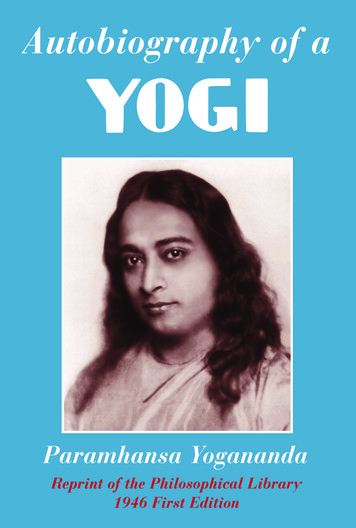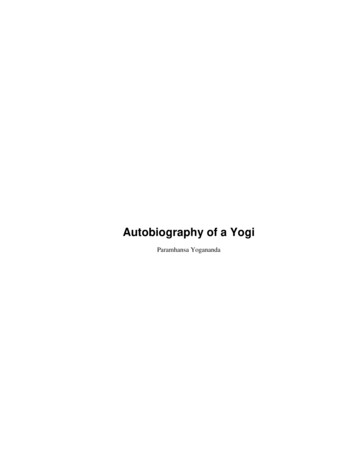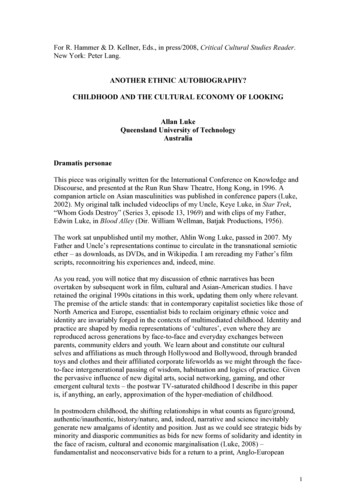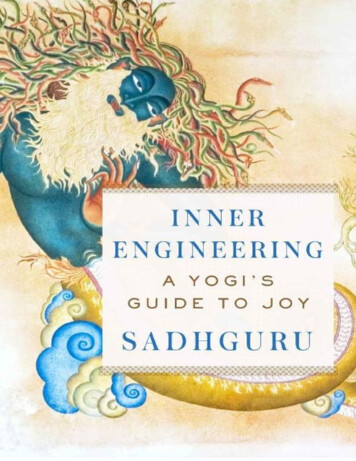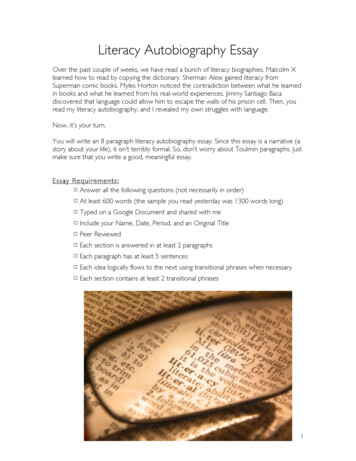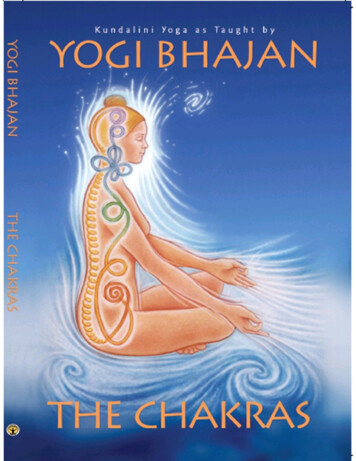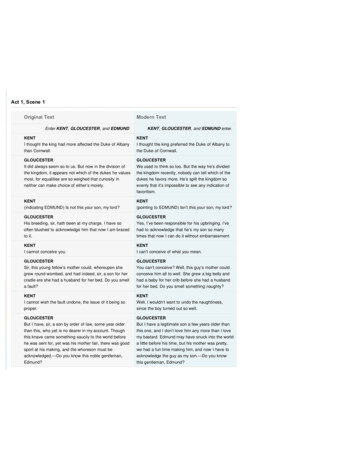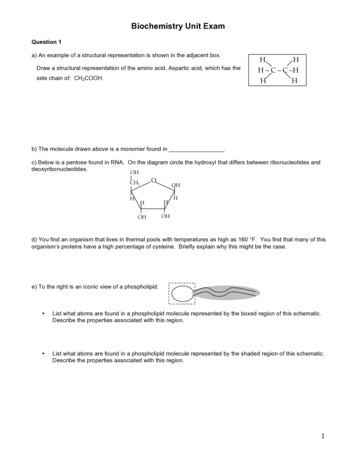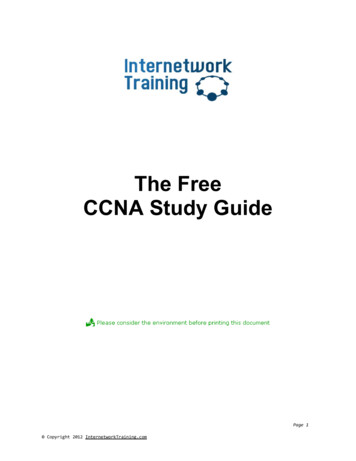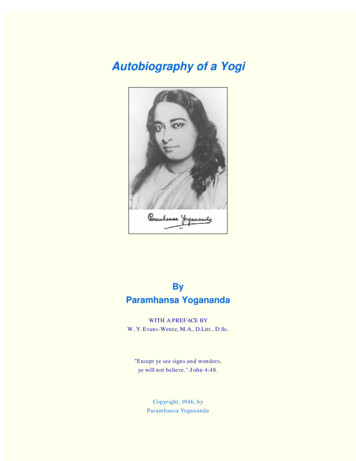
Transcription
Autobiography of a YogiByParamhansa YoganandaWITH A PREFACE BYW. Y. Evans-Wentz, M.A., D.Litt., D.Sc."Except ye see signs and wonders,ye will not believe."-John 4:48.Copyright, 1946, byParamhansa Yogananda
Dedicated To The Memory OfLUTHER BURBANKAn American SaintContentsPreface, By W. Y. EVANS-WENTZList of IllustrationsChapter1. My Parents and Early Life2. Mother's Death and the Amulet3. The Saint with Two Bodies (Swami Pranabananda)4. My Interrupted Flight Toward the Himalaya5. A "Perfume Saint" Performs his Wonders6. The Tiger Swami7. The Levitating Saint (Nagendra Nath Bhaduri)8. India's Great Scientist and Inventor, Jagadis Chandra Bose9. The Blissful Devotee and his Cosmic Romance (Master Mahasaya)10. I Meet my Master, Sri Yukteswar11. Two Penniless Boys in Brindaban12. Years in my Master's Hermitage13. The Sleepless Saint (Ram Gopal Muzumdar)14. An Experience in Cosmic Consciousness15. The Cauliflower Robbery16. Outwitting the Stars17. Sasi and the Three Sapphires18. A Mohammedan Wonder-Worker (Afzal Khan)19. My Guru Appears Simultaneously in Calcutta and Serampore20. We Do Not Visit Kashmir21. We Visit Kashmir22. The Heart of a Stone Image23. My University Degree24. I Become a Monk of the Swami Order25. Brother Ananta and Sister Nalini26. The Science of Kriya Yoga27. Founding of a Yoga School at Ranchi28. Kashi, Reborn and Rediscovered
29. Rabindranath Tagore and I Compare Schools30. The Law of Miracles31. An Interview with the Sacred Mother (Kashi Moni Lahiri)32. Rama is Raised from the Dead33. Babaji, the Yogi-Christ of Modern India34. Materializing a Palace in the Himalayas35. The Christlike Life of Lahiri Mahasaya36. Babaji's Interest in the West37. I Go to America38. Luther Burbank -- An American Saint39. Therese Neumann, the Catholic Stigmatist of Bavaria40. I Return to India41. An Idyl in South India42. Last Days with my Guru43. The Resurrection of Sri Yukteswar44. With Mahatma Gandhi at Wardha45. The Bengali "Joy-Permeated Mother" (Ananda Moyi Ma)46. The Woman Yogi who Never Eats (Giri Bala)47. I Return to the West48. At Encinitas in CaliforniaILLUSTRATIONSFrontispieceMap of IndiaMy Father, Bhagabati Charan GhoshMy MotherSwami Pranabananda, "The Saint With Two Bodies"My Elder Brother, AnantaFestival Gathering in the Courtyard of my Guru's Hermitage in SeramporeNagendra Nath Bhaduri, "The Levitating Saint"Myself at Age 6Jagadis Chandra Bose, Famous ScientistTwo Brothers of Therese Neumann, at KonnersreuthMaster Mahasaya, the Blissful DevoteeJitendra Mazumdar, my Companion on the "Penniless Test" at BrindabanAnanda Moyi Ma, the "Joy-Permeated Mother"Himalayan Cave Occupied by BabajiSri Yukteswar, My MasterSelf-Realization Fellowship, Los Angeles Headquarters
Self-Realization Church of All Religions, HollywoodMy Guru's Seaside Hermitage at PuriSelf-Realization Church of All Religions, San DiegoMy Sisters -- Roma, Nalini, and UmaMy Sister UmaThe Lord in His Aspect as ShivaYogoda Math, Hermitage at DakshineswarRanchi School, Main BuildingKashi, Reborn and RediscoveredBishnu, Motilal Mukherji, my Father, Mr. Wright, T.N. Bose, Swami SatyanandaGroup of Delegates to the International Congress of Religious Liberals, Boston, 1920A Guru and Disciple in an Ancient HermitageBabaji, the Yogi-Christ of Modern IndiaLahiri MahasayaA Yoga Class in Washington, D.C.Luther BurbankTherese Neumann of Konnersreuth, BavariaThe Taj Mahal at AgraShankari Mai Jiew, Only Living Disciple of the great Trailanga SwamiKrishnananda with his Tame LionessGroup on the Dining Patio of my Guru's Serampore HermitageMiss Bletch, Mr. Wright, and myself -- in EgyptRabindranath TagoreSwami Keshabananda, at his Hermitage in BrindabanKrishna, Ancient Prophet of IndiaMahatma Gandhi, at WardhaGiri Bala, the Woman Yogi Who Never EatsMr. E. E. DickinsonMy Guru and MyselfRanchi StudentsEncinitasConference in San FranciscoSwami PremanandaMy Father
Map of IndiaPREFACEBy W. Y. EVANS-WENTZ, M.A., D.Litt., D.Sc.Jesus College, Oxford; Author ofThe Tibetan Book of the Dead,Tibet's Great Yogi Milarepa,Tibetan Yoga and Secret Doctrines, etc.The value of Yogananda's Autobiography is greatly enhanced by the fact that it is one of the few books inEnglish about the wise men of India which has been written, not by a journalist or foreigner, but by one oftheir own race and training--in short, a book about yogis by a yogi. As an eyewitness recountal of theextraordinary lives and powers of modern Hindu saints, the book has importance both timely and timeless.To its illustrious author, whom I have had the pleasure of knowing both in India and America, may everyreader render due appreciation and gratitude. His unusual life-document is certainly one of the mostrevealing of the depths of the Hindu mind and heart, and of the spiritual wealth of India, ever to bepublished in the West.It has been my privilege to have met one of the sages whose life- history is herein narrated-Sri YukteswarGiri. A likeness of the venerable saint appeared as part of the frontispiece of my Tibetan Yoga and SecretDoctrines. 1-1 It was at Puri, in Orissa, on the Bay of Bengal, that I encountered Sri Yukteswar. He was thenthe head of a quiet ashrama near the seashore there, and was chiefly occupied in the spiritual training of agroup of youthful disciples. He expressed keen interest in the welfare of the people of the United States andof all the Americas, and of England, too, and questioned me concerning the distant activities, particularlythose in California, of his chief disciple, Paramhansa Yogananda, whom he dearly loved, and whom he hadsent, in 1920, as his emissary to the West.Sri Yukteswar was of gentle mien and voice, of pleasing presence, and worthy of the veneration which his
followers spontaneously accorded to him. Every person who knew him, whether of his own community ornot, held him in the highest esteem. I vividly recall his tall, straight, ascetic figure, garbed in the saffroncolored garb of one who has renounced worldly quests, as he stood at the entrance of the hermitage to giveme welcome. His hair was long and somewhat curly, and his face bearded. His body was muscularly firm,but slender and well-formed, and his step energetic. He had chosen as his place of earthly abode the holy cityof Puri, whither multitudes of pious Hindus, representative of every province of India, come daily onpilgrimage to the famed Temple of Jagannath, "Lord of the World." It was at Puri that Sri Yukteswar closedhis mortal eyes, in 1936, to the scenes of this transitory state of being and passed on, knowing that hisincarnation had been carried to a triumphant completion. I am glad, indeed, to be able to record thistestimony to the high character and holiness of Sri Yukteswar. Content to remain afar from the multitude, hegave himself unreservedly and in tranquillity to that ideal life which Paramhansa Yogananda, his disciple,has now described for the ages. W. Y. EVANS-WENTZ1-1: Oxford University Press, 1935.Author's AcknowledgmentsI am deeply indebted to Miss L. V. Pratt for her long editorial labors over the manuscript of this book. Mythanks are due also to Miss Ruth Zahn for preparation of the index, to Mr. C. Richard Wright for permissionto use extracts from his Indian travel diary, and to Dr. W. Y. Evans-Wentz for suggestions andencouragement.PARAMHANSA YOGANANDAOctober 28, 1945Encinitas, CaliforniaCHAPTER: 1My Parents and Early LifeThe characteristic features of Indian culture have long been a search for ultimate verities and theconcomitant disciple-guru 1-2 relationship. My own path led me to a Christlike sage whosebeautiful life was chiseled for the ages. He was one of the great masters who are India's sole
remaining wealth. Emerging in every generation, they have bulwarked their land against the fateof Babylon and Egypt.I find my earliest memories covering the anachronistic features of a previous incarnation. Clearrecollections came to me of a distant life, a yogi 1-3 amidst the Himalayan snows. These glimpsesof the past, by some dimensionless link, also afforded me a glimpse of the future.The helpless humiliations of infancy are not banished from my mind. I was resentfully consciousof not being able to walk or express myself freely. Prayerful surges arose within me as I realizedmy bodily impotence. My strong emotional life took silent form as words in many languages.Among the inward confusion of tongues, my ear gradually accustomed itself to thecircumambient Bengali syllables of my people. The beguiling scope of an infant's mind! adultlyconsidered limited to toys and toes.Psychological ferment and my unresponsive body brought me to many obstinate crying-spells. Irecall the general family bewilderment at my distress. Happier memories, too, crowd in on me:my mother's caresses, and my first attempts at lisping phrase and toddling step. These earlytriumphs, usually forgotten quickly, are yet a natural basis of self-confidence.My far-reaching memories are not unique. Many yogis are known to have retained their selfconsciousness without interruption by the dramatic transition to and from "life" and "death." Ifman be solely a body, its loss indeed places the final period to identity. But if prophets down themillenniums spake with truth, man is essentially of incorporeal nature. The persistent core ofhuman egoity is only temporarily allied with sense perception.Although odd, clear memories of infancy are not extremely rare. During travels in numerouslands, I have listened to early recollections from the lips of veracious men and women.I was born in the last decade of the nineteenth century, and passed my first eight years atGorakhpur. This was my birthplace in the United Provinces of northeastern India. We were eightchildren: four boys and four girls. I, Mukunda Lal Ghosh 1-4, was the second son and the fourthchild.Father and Mother were Bengalis, of the kshatriya caste. 1-5 Both were blessed with saintlynature. Their mutual love, tranquil and dignified, never expressed itself frivolously. A perfectparental harmony was the calm center for the revolving tumult of eight young lives.Father, Bhagabati Charan Ghosh, was kind, grave, at times stern. Loving him dearly, we childrenyet observed a certain reverential distance. An outstanding mathematician and logician, he wasguided principally by his intellect. But Mother was a queen of hearts, and taught us only throughlove. After her death, Father displayed more of his inner tenderness. I noticed then that his gazeoften metamorphosed into my mother's.In Mother's presence we tasted our earliest bitter-sweet acquaintance with the scriptures. Talesfrom the mahabharata and ramayana 1-6 were resourcefully summoned to meet the exigencies
of discipline. Instruction and chastisement went hand in hand.A daily gesture of respect to Father was given by Mother's dressing us carefully in the afternoonsto welcome him home from the office. His position was similar to that of a vice-president, in theBengal-Nagpur Railway, one of India's large companies. His work involved traveling, and ourfamily lived in several cities during my childhood.Mother held an open hand toward the needy. Father was also kindly disposed, but his respect forlaw and order extended to the budget. One fortnight Mother spent, in feeding the poor, more thanFather's monthly income."All I ask, please, is to keep your charities within a reasonable limit." Even a gentle rebuke fromher husband was grievous to Mother. She ordered a hackney carriage, not hinting to the childrenat any disagreement."Good-by; I am going away to my mother's home." Ancient ultimatum!We broke into astounded lamentations. Our maternal uncle arrived opportunely; he whispered toFather some sage counsel, garnered no doubt from the ages. After Father had made a fewconciliatory remarks, Mother happily dismissed the cab. Thus ended the only trouble I evernoticed between my parents. But I recall a characteristic discussion."Please give me ten rupees for a hapless woman who has just arrived at the house." Mother'ssmile had its own persuasion."Why ten rupees? One is enough." Father added a justification: "When my father andgrandparents died suddenly, I had my first taste of poverty. My only breakfast, before walkingmiles to my school, was a small banana. Later, at the university, I was in such need that I appliedto a wealthy judge for aid of one rupee per month. He declined, remarking that even a rupee isimportant.""How bitterly you recall the denial of that rupee!" Mother's heart had an instant logic. "Do youwant this woman also to remember painfully your refusal of ten rupees which she needsurgently?""You win!" With the immemorial gesture of vanquished husbands, he opened his wallet. "Here isa ten-rupee note. Give it to her with my good will."Father tended to first say "No" to any new proposal. His attitude toward the strange woman whoso readily enlisted Mother's sympathy was an example of his customary caution. Aversion toinstant acceptance- typical of the French mind in the West-is really only honoring the principle of"due reflection." I always found Father reasonable and evenly balanced in his judgments. If Icould bolster up my numerous requests with one or two good arguments, he invariably put thecoveted goal within my reach, whether it were a vacation trip or a new motorcycle.
Father was a strict disciplinarian to his children in their early years, but his attitude towardhimself was truly Spartan. He never visited the theater, for instance, but sought his recreation invarious spiritual practices and in reading the bhagavad gita. 1-7 Shunning all luxuries, he wouldcling to one old pair of shoes until they were useless. His sons bought automobiles after theycame into popular use, but Father was always content with the trolley car for his daily ride to theoffice. The accumulation of money for the sake of power was alien to his nature. Once, afterorganizing the Calcutta Urban Bank, he refused to benefit himself by holdi
The value of Yogananda's Autobiography is greatly enhanced by the fact that it is one of the few books in English about the wise men of India which has been written, not by a journalist or foreigner, but by one of their own race and training--in short, a book about yogis by a yogi. As an eyewitness recountal of the extraordinary lives and powers of modern Hindu saints, the book has importance .
